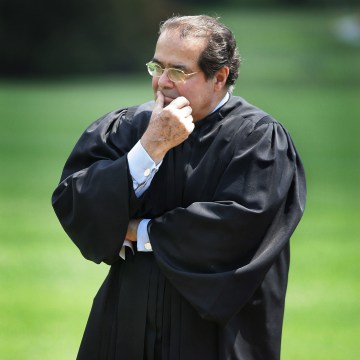February 13, 2016

Ron Edmunds/Associated Press
Antonin Scalia, dead unexpectedly this weekend at 79, was not the most politically powerful justice during his three decades on the Supreme Court. That distinction belonged to the court’s two swing votes, Sandra Day O’Connor and then Anthony M. Kennedy, respectively the philosopher queen and king of our fraying republican order.
Unlike them, Scalia did not have the opportunity to write all his preferences into the law of the land. For every victory he won, there was a sharp defeat; for every important majority opinion a stinging, quotable dissent. And on the issues he cared the most about – abortion, above all – his defeats were famous and his dissents often not just eloquent but anguished.
But in every other respect, he was the most important Supreme Court justice of his era.
He was important because of his intellectual influence. There were and are many legal theories and schools of constitutional interpretation within the world of American conservatism. But Scalia’s combination of brilliance, eloquence and good timing — he was appointed to the court in 1986, a handful of years after the Federalist Society was founded, and with it the conservative legal movement as we know it — ensured that his ideas, originalism in constitutional law and textualism in statutory interpretation, would set the agenda for a serious judicial conservatism and define the worldview that any “living Constitution” liberal needed to wrestle with in order to justify his own position.
This intellectual importance was compounded by the way he strained to be consistent, to rule based on principle rather than on his partisan biases — which made him stand out in an age when justices often seem as purely partisan as any other office holder. Of course there were plenty of cases (“Bush v. Gore!” a liberal might interject here) in which those biases probably did shape the way he ruled. But from flag burning to the rights of the accused to wartime detention, Scalia had a long record of putting originalist principle above a partisan conservatism. And this, too, set an example for his fellow conservatives: The fact that today the court’s right-leaning bloc has far more interesting internal disagreements than the often lock-step-voting liberal wing is itself a testament to the premium its leading intellectual light placed on philosophical rigor and integrity.
Finally, Scalia’s eloquence and brio ensured that his influence was not just intellectual but also personal. Countless conservative legal eagles who came of age after 1986 will talk about how it was Scalia who inspired them to pursue a career in the law, Scalia who showed them what it meant to be an intellectually fulfilled right-winger in a profession that tilts left, Scalia whose good-humored zest for intellectual combat shaped their own approach to controversy. Indeed, there are few professional conservatives, period — academics or think tankers or even newspaper columnists — who have not been influenced in some sense by Scalia’s words, his writing, his mind.
And not only conservatives: From the first, but more so as he aged, liberals recognized Antonin Scalia as their side’s Great Antagonist, the kind of larger-than-life personality that you despise and admire in equal measure, a foe who inspires not just self-righteousness but also, occasionally, self-doubt.
It is because of all of this — because of his immense influence, his intellectual clout, his long cultural shadow — that Scalia’s death in a presidential year promises to be a nightmare for the republic.
As absurd as it often feels to have Anthony Kennedy as the last arbiter of everything, in a way we’ve been weirdly fortunate in the court’s long-running 5-4-with-a-swing-vote split. It’s allowed both halves of our polarized republic to feel somewhat represented on the highest court, to feel as if they have at least a fighting chance in the majority of controversies, to feel as if there’s some legitimacy — not a lot, maybe, but some — to the decisions of our unelected guardians. (As much as liberals may hate the Roberts court for Citizens United, it also gave them same-sex marriage and protected Obamacare; as much as conservatives object to Kennedy’s ruling in Obergefell, they’re grateful for his ruling in Hobby Lobby.)
To have the intellectual godfather of the conservative bloc replaced by a liberal appointee would upset this balance, perhaps irrevocably. As it was for a time — and not a happy time — in the 1960s and 1970s, the court would simply become the Enemy to half the country, a vanguard force pulling the political order to the left.
This reality trumps the patterns of (very modest) compromise that enabled Samuel Alito, John Roberts, Elena Kagan and Sonia Sotomayor to win confirmation, and it makes it impossible to imagine Republican senators confirming an Obama appointee in the next 11 months. And it’s probably a good thing for the republic that they won’t: If there is to be a liberal replacement for a figure as towering as Scalia, if the court is about to swing sharply to the left, it’s far better for the judicial branch’s legitimacy if that swing follows a democratic election, a campaign in which the high court stakes are front and center in the race.
But because they will be front and center, Scalia’s death promises a war like none other between here and November, and an extra layer of insanity in a campaign already defined by radicals and demagogues.
The irony is that this kind of high-stakes collision of law and politics is precisely the thing that Scalia’s legal philosophy strained to curb and check and roll back, by promoting a more limited and humble vision of the Supreme Court’s role in our republic.
But for all of his importance, all his influence, in this effort he clearly failed — and what’s about to come will prove it.
No comments:
Post a Comment